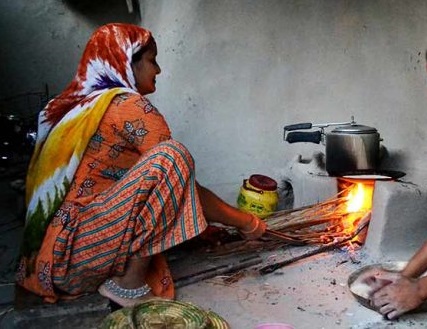Last Updated on January 30, 2024 1:27 am by INDIAN AWAAZ
The Pradhan Mantri Ujjwala Yojana (PMUY) had aimed to provide LPG cylinders to rural households, but high refill costs and cultural beliefs have hindered its success.

Staff Reporter / New Delhi
Approximately 500 million (50 crore) people in India do not have access to clean cooking solutions. They still uses wood, cow dung or other biomass as cooking fuel. According to a new study the use of traditional fuels like wood and biomass for cooking leads to significant health problems, environmental damage and greenhouse gas emissions. The Pradhan Mantri Ujjwala Yojana (PMUY) had aimed to provide LPG cylinders to rural households, but high refill costs and cultural beliefs have hindered its success.
The report “India’s Transition to E-cooking” by the independent think tank Centre for Science and Environment CSE suggests that a shift towards e-cooking in rural India can reduce emissions, health problems and economic burdens. The transition may cost Rs 1-5 lakh crore, but is essential for a sustainable, healthier future. Effective load management and capacity addition will be needed to meet peak power demands for e-cooking.
The report lays down a strategic roadmap which includes a phased approach with regard to multiple components such as electricity demand management, technology penetration, research and development on cooking devices and utensils specific to the cooking needs of rural households, affordability, financial support and building awareness and capacity to overcome social and cultural barriers through community engagement.
Equally importantly and comprehensively, the report tries to understand the roles of various stakeholders in the transition. It does not necessarily look into or recommend e-cooking as the only option for achieving the objective of clean cooking for all – CSE is of the opinion that e-cooking in conjunction with LPG-based initiatives can reduce traditional use of biomass.

Although the Ministry of Petroleum and Natural Gas (MOPNG) claims that the country’s household LPG “coverage” stands at 99.8 per cent, the National Family Health Survey conducted in 2019–21 (NFHS-5) shows that 41 per cent of the population still cooks on biomass, it said.
“CSE’s own calculations have found that this 41 per cent cumulatively emits — when it cooks on wood, cow dung or other biomass — around 340 million tonnes of CO2 (carbon dioxide) into the environment every year, which is about 13 per cent of India’s national GHG emissions,” the report said.
